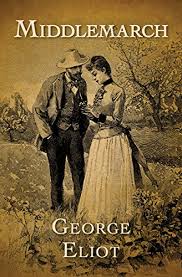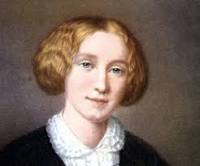Middlemarch Page #12
Middlemarch, A Study of Provincial Life is a novel by the English author George Eliot, appearing in eight instalments in 1871 and 1872. Set in a fictitious Midlands town from 1829 to 1832, it follows distinct, intersecting stories with many characters.
“I know that I must expect trials, uncle. Marriage is a state of higher duties. I never thought of it as mere personal ease,” said poor Dorothea. “Well, you are not fond of show, a great establishment, balls, dinners, that kind of thing. I can see that Casaubon’s ways might suit you better than Chettam’s. And you shall do as you like, my dear. I would not hinder Casaubon; I said so at once; for there is no knowing how anything may turn out. You have not the same tastes as every young lady; and a clergyman and scholar—who may be a bishop—that kind of thing—may suit you better than Chettam. Chettam is a good fellow, a good sound-hearted fellow, you know; but he doesn’t go much into ideas. I did, when I was his age. But Casaubon’s eyes, now. I think he has hurt them a little with too much reading.” “I should be all the happier, uncle, the more room there was for me to help him,” said Dorothea, ardently. “You have quite made up your mind, I see. Well, my dear, the fact is, I have a letter for you in my pocket.” Mr. Brooke handed the letter to Dorothea, but as she rose to go away, he added, “There is not too much hurry, my dear. Think about it, you know.” When Dorothea had left him, he reflected that he had certainly spoken strongly: he had put the risks of marriage before her in a striking manner. It was his duty to do so. But as to pretending to be wise for young people,—no uncle, however much he had travelled in his youth, absorbed the new ideas, and dined with celebrities now deceased, could pretend to judge what sort of marriage would turn out well for a young girl who preferred Casaubon to Chettam. In short, woman was a problem which, since Mr. Brooke’s mind felt blank before it, could be hardly less complicated than the revolutions of an irregular solid. CHAPTER V. “Hard students are commonly troubled with gowts, catarrhs, rheums, cachexia, bradypepsia, bad eyes, stone, and collick, crudities, oppilations, vertigo, winds, consumptions, and all such diseases as come by over-much sitting: they are most part lean, dry, ill-colored … and all through immoderate pains and extraordinary studies. If you will not believe the truth of this, look upon great Tostatus and Thomas Aquainas’ works; and tell me whether those men took pains.”—BURTON’S Anatomy of Melancholy, P. I, s. 2. This was Mr. Casaubon’s letter. MY DEAR MISS BROOKE,—I have your guardian’s permission to address you on a subject than which I have none more at heart. I am not, I trust, mistaken in the recognition of some deeper correspondence than that of date in the fact that a consciousness of need in my own life had arisen contemporaneously with the possibility of my becoming acquainted with you. For in the first hour of meeting you, I had an impression of your eminent and perhaps exclusive fitness to supply that need (connected, I may say, with such activity of the affections as even the preoccupations of a work too special to be abdicated could not uninterruptedly dissimulate); and each succeeding opportunity for observation has given the impression an added depth by convincing me more emphatically of that fitness which I had preconceived, and thus evoking more decisively those affections to which I have but now referred. Our conversations have, I think, made sufficiently clear to you the tenor of my life and purposes: a tenor unsuited, I am aware, to the commoner order of minds. But I have discerned in you an elevation of thought and a capability of devotedness, which I had hitherto not conceived to be compatible either with the early bloom of youth or with those graces of sex that may be said at once to win and to confer distinction when combined, as they notably are in you, with the mental qualities above indicated. It was, I confess, beyond my hope to meet with this rare combination of elements both solid and attractive, adapted to supply aid in graver labors and to cast a charm over vacant hours; and but for the event of my introduction to you (which, let me again say, I trust not to be superficially coincident with foreshadowing needs, but providentially related thereto as stages towards the completion of a life’s plan), I should presumably have gone on to the last without any attempt to lighten my solitariness by a matrimonial union. Such, my dear Miss Brooke, is the accurate statement of my feelings; and I rely on your kind indulgence in venturing now to ask you how far your own are of a nature to confirm my happy presentiment. To be accepted by you as your husband and the earthly guardian of your welfare, I should regard as the highest of providential gifts. In return I can at least offer you an affection hitherto unwasted, and the faithful consecration of a life which, however short in the sequel, has no backward pages whereon, if you choose to turn them, you will find records such as might justly cause you either bitterness or shame. I await the expression of your sentiments with an anxiety which it would be the part of wisdom (were it possible) to divert by a more arduous labor than usual. But in this order of experience I am still young, and in looking forward to an unfavorable possibility I cannot but feel that resignation to solitude will be more difficult after the temporary illumination of hope. In any case, I shall remain, Yours with sincere devotion, EDWARD CASAUBON. Dorothea trembled while she read this letter; then she fell on her knees, buried her face, and sobbed. She could not pray: under the rush of solemn emotion in which thoughts became vague and images floated uncertainly, she could but cast herself, with a childlike sense of reclining, in the lap of a divine consciousness which sustained her own. She remained in that attitude till it was time to dress for dinner. How could it occur to her to examine the letter, to look at it critically as a profession of love? Her whole soul was possessed by the fact that a fuller life was opening before her: she was a neophyte about to enter on a higher grade of initiation. She was going to have room for the energies which stirred uneasily under the dimness and pressure of her own ignorance and the petty peremptoriness of the world’s habits. Now she would be able to devote herself to large yet definite duties; now she would be allowed to live continually in the light of a mind that she could reverence. This hope was not unmixed with the glow of proud delight—the joyous maiden surprise that she was chosen by the man whom her admiration had chosen. All Dorothea’s passion was transfused through a mind struggling towards an ideal life; the radiance of her transfigured girlhood fell on the first object that came within its level. The impetus with which inclination became resolution was heightened by those little events of the day which had roused her discontent with the actual conditions of her life.
Translation
Translate and read this book in other languages:
Select another language:
- - Select -
- 简体中文 (Chinese - Simplified)
- 繁體中文 (Chinese - Traditional)
- Español (Spanish)
- Esperanto (Esperanto)
- 日本語 (Japanese)
- Português (Portuguese)
- Deutsch (German)
- العربية (Arabic)
- Français (French)
- Русский (Russian)
- ಕನ್ನಡ (Kannada)
- 한국어 (Korean)
- עברית (Hebrew)
- Gaeilge (Irish)
- Українська (Ukrainian)
- اردو (Urdu)
- Magyar (Hungarian)
- मानक हिन्दी (Hindi)
- Indonesia (Indonesian)
- Italiano (Italian)
- தமிழ் (Tamil)
- Türkçe (Turkish)
- తెలుగు (Telugu)
- ภาษาไทย (Thai)
- Tiếng Việt (Vietnamese)
- Čeština (Czech)
- Polski (Polish)
- Bahasa Indonesia (Indonesian)
- Românește (Romanian)
- Nederlands (Dutch)
- Ελληνικά (Greek)
- Latinum (Latin)
- Svenska (Swedish)
- Dansk (Danish)
- Suomi (Finnish)
- فارسی (Persian)
- ייִדיש (Yiddish)
- հայերեն (Armenian)
- Norsk (Norwegian)
- English (English)
Citation
Use the citation below to add this book to your bibliography:
Style:MLAChicagoAPA
"Middlemarch Books." Literature.com. STANDS4 LLC, 2024. Web. 24 Nov. 2024. <https://www.literature.com/book/middlemarch_242>.




Discuss this Middlemarch book with the community:
Report Comment
We're doing our best to make sure our content is useful, accurate and safe.
If by any chance you spot an inappropriate comment while navigating through our website please use this form to let us know, and we'll take care of it shortly.
Attachment
You need to be logged in to favorite.
Log In